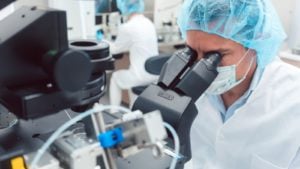iBio Pharma (NYSEAMERICAN:IBIO) remains behind in the world’s vaccine quest. And just as quickly as it rose, IBIO stock is quickly fading into irrelevance.

The company’s FastPharming platform, using plant-based protein production, is unique and interesting. I can see how theoretically it could be used to quickly mass-produce a novel coronavirus vaccine.
But the reality of the matter is that iBio is falling far behind its competitors in the race to find a Covid-19 vaccine. It needs to have a lot go right – by having other companies’ vaccine candidates fail.
Currently there are eight vaccine candidates undergoing Phase 3 testing, and two others in China and Russia that have been approved for early or limited use.
For IBIO stock to have any value, the pandemic would have to go unchecked through the winter and into next spring, and for current Phase 3 trials conducted by AstraZeneca (NYSE:AZN), Moderna (NASDAQ:MDRA) and others to fail.
iBio Has Fallen Behind
The most recent news from iBio was more than two weeks ago, when iBio announced the conclusion of 10 preclinical studies for its coronavirus vaccine candidate.
iBio is fusing one a proprietary lichenase carrier molecule to a coronavirus subunit protein in hopes of producing a Covid-19 vaccine. The company announced on Aug. 10 that testing in mice produced evidence of antibodies.
“We are encouraged by these pre-clinical data, which demonstrate IBIO-201’s ability to generate an immune response to SARS-CoV-2 sequences and neutralize protein interaction,” said Tom Isett, iBio’s chairman and CEO. “We expect to gain more insight as we complete data analysis of both of our COVID-19 vaccine candidates.”
The problem, from the perspective of IBIO stock, is that these tests are only in the preclinical stages. We are a long, long way from Phase 3 tests such as those currently being conducted by Moderna and AstraZeneca.
And Wall Street isn’t being fooled. IBIO stock fell by more than 55% since that Aug. 10 announcement.
One of company’s biggest investors, Eastern Capital, led the charge to bail out of the company. Eastern had owned more than 5% of the company, but on Aug. 12 it sold more than 7.6 million shares to take its stake down to 0.6% of the company.
Currently IBIO is trading in penny stock territory, down to $1.70 per share as of this writing. That’s a drop of more than 73% from its peak just a month ago.
I think that trend is going to continue.
IBIO Stock and FastPharming
Much of the positive investor sentiment in IBIO stock has to do with the company’s FastPharming technology. FastPharming uses automated hydroponics and vertical farming systems to produce biological medicines. The idea is that plant-based solutions could manufacture the recombinant proteins much faster than more traditional systems.
The company says that the FastPharming system could be used to produce 500,000 doses of a coronavirus vaccine.
iBio has a 130,000-square-foot facility in College Station, Texas, that is near the Texas A&M campus, with which it has had a master joint development agreement since 2016. It’s producing its vaccine candidates, and refining its FastPharming technique, in conjunction with the university.
What it doesn’t have at this point is a partner with a viable vaccine. As I mentioned, iBio’s own vaccine candidate is only in preclinical trials. It’s not working with AstraZeneca, Moderna, Pfizer (NYSE:PFE) or any of the other major players that are further along in efforts for a Covid-19 vaccine. It’s not working with any company in Europe, either.
The only deal that iBio has publicized is its partnership with CC-Pharming in Beijing to jointly develop products for the Chinese pharma market.
The Bottom Line
iBio can’t be consider a legitimate player in developing a Covid-19 vaccine, and it doesn’t have a partner in sight to use its FastPharming technique.
A month ago, IBIO stock was trading at $6 per share. I don’t see iBio shares climbing back to that level this year. It’s more likely that IBIO will finish 2020 about where it began – at about 30 cents per share.
Patrick Sanders is a freelance writer and editor in Maryland, and from 2015 to 2019 was head of the investment advice section at U.S. News & World Report. Follow him on Twitter at @1patricksanders. As of this writing, he did not have a position in any of the aforementioned securities.
